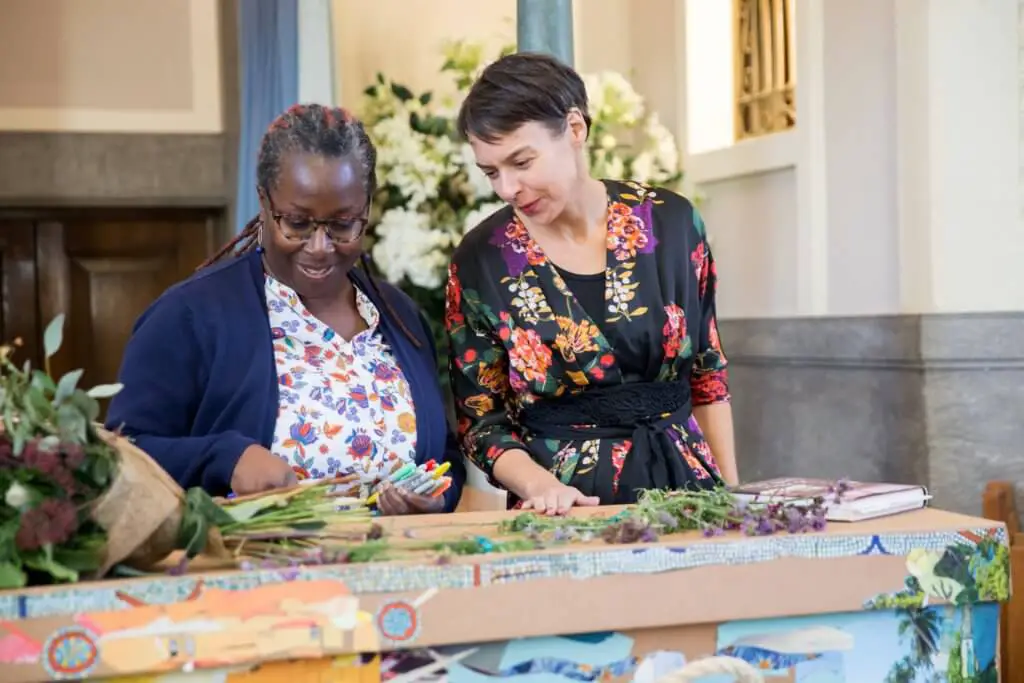What is a celebrant
A celebrant is someone who performs or officiates ceremonies. They are trained in providing custom ceremonies such as weddings, and civil ceremonies. They can also officiate vow renewals, baby naming ceremonies and funerals.
You can choose to become a:
- Funeral celebrant: organises, and conducts funeral services as well as offering support to the bereaved family
- Wedding celebrant: constructs and leads personalised weddings, renewal and vows ceremonies
- Family celebrant: involved with other life ceremonies such as naming, adopting, and divorce ceremonies
What does a celebrant do?
The role of a celebrant is to perform at formal ceremonies. When someone books a celebrant they can have personalised vows, music and readings.
A wedding celebrant will work closely with the couple leading up to the ceremony to make sure the wedding is personal and unique to their needs.
A funeral celebrant will host the funeral service. As well as conducting the funeral itself, celebrants are involved in planning the order of the service, choosing the music, and creating a meaningful ceremony for the person who has died.
There are two main types of celebrants:
- Humanist: a humanist service is regarded as a non-religious ceremony eg at a funeral there would be no prayers or bible readings
- Civil: a civil celebrant tailors the service to the client’s religious needs. E.g singing hymns and having the lord’s prayer read
Depending on whether you’re a humanist or civil celebrant, the requirements of each service will differ and it is their responsibility to tailor each service to the clients specific needs.

What skills do you need to become a celebrant?
Celebrants oversee important ceremonies, some of the key skills needed to be successful in this role include:
- Excellent communication and public speaking skills: you need to be an excellent listener and communicator to listen to facts and turn them into accurate ceremony scripts.
- A sense of compassion and empathy: if you apply for funeral training you must be able to work compassionately with bereaved families.
- A friendly persona: you need to be able to work with a wide variety of backgrounds, with an ability to encourage people to open up.
Good organisation skills: you need to be punctual, and able to manage your time well to tight deadlines.
What qualifications do you need to become a celebrant
You do not need any formal qualifications to become a celebrant, although training is often required. The most common way to become a celebrant is to complete a private celebrant training course such as:
- The international college of professional celebrants, offers both online and residential training courses giving you an NOCN qualification.
- Humanist UK
Steps to become a celebrant:
Step 1: Complete a training course:
There are a number of celebrant training courses you can choose. Consider your budget, preferred learning style and whether you want to be a wedding, funeral or other celebrant. These courses will take you through the steps to create bespoke ceremonies, improve your presentation skills and teach you how to run a business smoothly.
Step 2: Apply to become a celebrant:
Once you have decided what route you want to take, you can start applying for local celebrant jobs.
Step 3: Set up your own celebrant business:
Once you have the necessary skills and knowledge of how to be a celebrant, the next step can be to set up your own business. It’ll be important to market your business online to get people interested. You can join the Acadamy of Modern Celebrancy (AMC) and join the community of other celebrants and gain support for your business.
How much do celebrants earn in the UK?
Depending on the type of celebrant you become and whether you’re self-employed, the salary can vary greatly, for example, on average, a funeral celebrant earns £190 per service, whereas a wedding celebrant could charge £650 for a service.
Related occupations
Occupations related to the role of a celebrant include:
- Psychologist
- Child psychotherapist
- Psychoanalyst
- Social worker
- Family support worker
- Life coach
- Counsellor
References:
1. https://onlinecounselingprograms.com/become-a-counselor/25-reasons-why-you-should-become-a-counselor/
2. https://onlinecounselingprograms.com/become-a-counselor/25-reasons-why-you-should-become-a-counselor/

